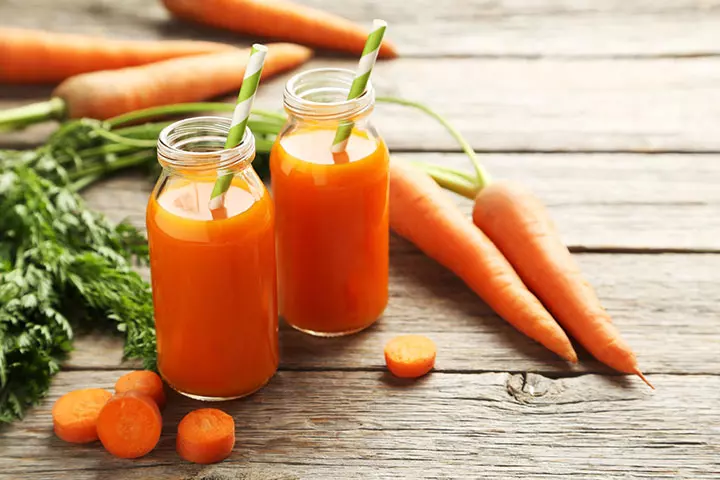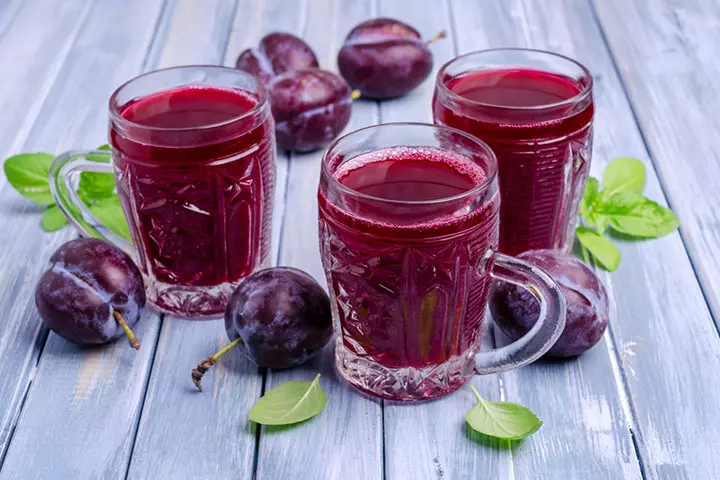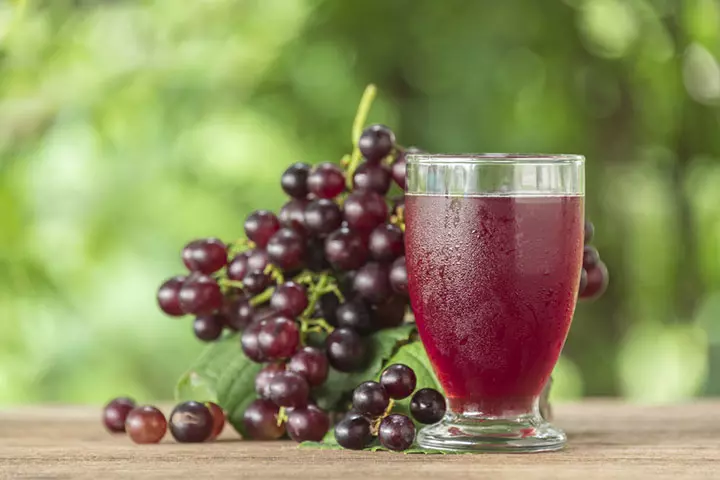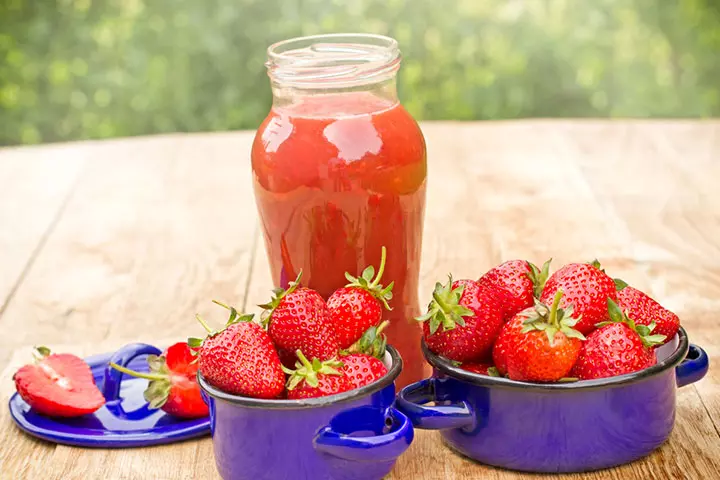
Image: Midjourney/ MomJunction Design Team
Optimum hydration during pregnancy is vital to support digestion, form amniotic fluidiThe protective liquid that surrounds the fetus during pregnancy , and increase blood volume for fetal growth. Hence, pregnant women should drink at least ten cups of fluid daily (1). Here are some healthy juices to drink during pregnancy that provide essential nutrients for proper fetal growth and development. Besides, healthy eating is an essential part of prenatal care; hence, they will add variety to your pregnancy diet. However, although these juices are nutritious, they are also high in natural sugar. Hence, limit your intake of juices and instead consume whole fruits that provide essential nutrients, including fiber.

Key Pointers
- Choose whole fruits for nutrients and fiber over juice with high natural sugar; limit intake for a nutritious option.
- Orange, cranberry, and grape juices are loaded with vitamins and antioxidants and offer a number of health benefits.
- Avoid juices with excessive sugar and calorie content.
- Consult your doctor before drinking any juice while pregnant.
Juices You May Have During Pregnancy
Rasha Nasser, a mom, talks about her pregnancy habits and how drinking plenty of juices was a key part of it. She thinks it made a significant difference for her newborn, stating, “Throughout my pregnancy, I juiced every single day. Green juice, apple juice, carrot juice, and different combinations of juice all ran through my veins and replenished my system and that of my baby. He was born and could hold his head up and I still do believe that his strength is directly related to the juices I have been consuming. I focused on fetal development and requirements and juiced ingredients that would help boost my health and that of my growing baby in me (i).”
Following is the list of 14 nutritious and healthy juices that you might want to include in your pregnancy diet. Consuming these healthy and refreshing drinks during pregnancy supports both maternal health and fetal development.
1. Orange juice
How to make:
- Slightly squeeze or roll the oranges firmly using your palms on the table counter.
- Peel them, and slice into four parts.
- Blend in a grinder or juicer. If it is too dry, add enough water and some sweetener for taste.
- If you do not want the pulp, strain the juice.
- Enjoy the glass of freshly squeezed and unpasteurized orange juice
A mother and blogger, Vanessa Gregoria, shares her go-to orange juice recipe during pregnancy. She says, “I have also been adding juices and smoothies back into my routine. I haven’t been able to get fresh organic apples for a few weeks now, so I decided to make a juice with the abundance of oranges that I order every week. My favorite juice at the moment is Orange, Carrot, and Ginger (ii).” She combines two peeled and quartered oranges, two washed and sliced carrots, and a washed knob of ginger, then juices them all together using a cold-press juicer for making this refreshing drink.
 Did you know?
Did you know?2. Cranberry juice
How to make:
- Take water in a large pan and add cranberries. Boil them.
- Lower the flame, and boil until the berries turn soft and burst open.
- Filter the juice using a muslin cloth or a strainer.
- You can add sugar or honey if the juice is sour.
- You can also combine it with some other fruit juice to enhance its flavor.
3. Carrot juice

How to make:
- Wash and scrub the carrots to remove dirt and any debris.
- Cut the vegetable into small pieces and add into a blender or juicer.
- Add water to keep the blender moving smoothly.
- Have it fresh.
4. Pineapple juice
How to make:
- Peel and chop the pineapple into small pieces.
- Put them in a blender, and add water and sugar.
- Collect clear juice by filtering through a strainer.
- Add water if the juice is very thick.
- Sprinkle some black salt, and this is optional.
- Have it fresh with some topped mint leaves.
 Quick tip
Quick tip5. Beetroot juice
How to make:
- Wash the beets and peel them.
- Cut into small pieces and put them in a blender or a juicer
- Puree till smooth, add sugar and water and blend it again.
- You might add lemon to enhance its flavor.
- Have it fresh.
6. Prune juice

How to make:
- Take one cup of dried prunes, and remove their pits.
- Boil five cups of water, and add to the pitted prunes until they are totally immersed.
- After soaking them for nearly 24 hours, blending them along with the water is required.
- Filter clear juice using a strainer.
- Combine the juice with the remaining boiled water.
- Have it fresh, and keep the remaining juice in the refrigerator. It stays fresh for a week.
7. Apple juice
How to make:
- Peel the skin and cut small pieces of apple.
- Add them to sufficient water and boil them.
- Allow it to cool, and blend them with water.
- Serve fresh apple juice, and you may add lemon juice for enhanced taste.
8. Pomegranate juice
How to make:
- Put the pomegranate arils into a blender, and blend until they are properly crushed.
- Use a strainer to filter the juice.
- You may use a spatula to press the pulp against the sieve.
- Have it fresh.
9. Grape juice

How to make:
- Soak grapes in a large bowel filled with water, and rinse them well.
- Put them into a blender, and add sugar if needed.
- Add water, and blend until you get a smooth consistency.
- Strain the juice using a filter.
- You may add a pinch of salt or fresh lemon juice for enhanced taste.
 Point to consider
Point to consider10. Guava juice
How to make:
- Peel and chop guava into small pieces.
- Put into a blender along with some water, and little sugar.
- Filter the juice using a strainer.
- You can add some fresh lemon juice or ginger for additional flavor.
- Have it immediately.
11. Peach juice
How to make:
- Peel, remove the pit and scoop out fresh peach flesh.
- Put them into a blender with some water, and blend to get a smooth consistency.
- Add enough sugar and blend again.
- Filter the juice through a strainer and have it fresh.
12. Strawberry juice

How to make:
- Rinse and chop the strawberries into small pieces.
- Add sufficient sugar, and blend everything to a smooth consistency.
- You may also add some fresh lemon juice to enhance the flavor.
- Using a strainer, filter the juice.
- Have the fresh juice immediately.
 Did you know?
Did you know?13. Lemon juice
How to make:
- Cut the lemon into two halves, and squeeze them to extract its juice.
- Add this extract into a glass of water.
- You may add sugar or honey, and consume it fresh.
14. Avocado Juice
How to make:
- Slice the avocados in half and remove the pit.
- Use a spoon to scoop out the green flesh into a blender.
- Pour in your choice of liquid, such as water, coconut water, or milk.
- If you prefer sweetness, add honey or sugar.
- For extra flavor, consider adding a splash of lime or lemon juice.
- Secure the blender lid and blend until you achieve a smooth consistency.
- Taste the juice and adjust the sweetness.
- Avocado tends to oxidize, so it’s best enjoyed right after preparation.
Incorporating these healthy juices into your daily routine is simple. Consider blending them into smoothies for added nutrition or mixing them with water for a refreshing drink.
Measures To Take When Having Juice

While there are no specific fruits to avoid during pregnancy, practicing caution when consuming fruit juices is essential. Here are some important things to do (7) (6):
- Consume moderately: Be mindful about the serving size of the juices, as they can be high in sugar and calories. Do not add extra sugar or salt to your juices. While excess sugar can contribute to unhealthy weight gain and increase the risk of gestational diabetes, too much salt can lead to high blood pressure and water retention.
- Choose safe produce: Consider buying organic fruits free of fertilizers and pesticides. Wash all produce thoroughly before juicing to remove dirt, potential contaminants, and pesticide residue.
- Prioritize food safety: Unpasteurized fruit juices, including packaged ones, might carry risks of bacteria, such as Listeria, E.Coli, Campylobacter, and Salmonella. Therefore, choose only homemade or pasteurized juices (7). According to the US Centers for Disease Control and Prevention (US CDC), Salmonella causes more than 1 million illnesses linked to food in the US annually (8).
- Follow best practices for homemade juice: Drink fresh juice immediately, as it can lose some of its nutritional value due to oxidation. If you need to store it, keep it in a clean, sealed container and refrigerate the juice below 40°F (4°C) for no more than 24 hours.
- Avoid high-risk foods for juicing: Avoid juicing foods with a higher risk of contamination. For instance, sprouts can harbor harmful bacteria, such as E.coli and salmonella, making them a risky choice for juicing.
- Choose juice with pulp: Do not strain juice after blending. Instead, retain its pulp or add it back after blending. The pulp provides fiber that supports digestion and keeps you full for longer. In addition, it can help control sugar spikes (9).
- Check for spoilage: Before consuming juice, inspect it for any signs of spoilage, such as changes in smell, taste, or appearance, to ensure it’s safe to drink.
- Consult your healthcare provider: Before making any dietary changes during pregnancy, including increasing or reducing fruit or fruit juice intake, speak to your healthcare provider to ensure it’s safe for you and your baby.
Amanda Wahlstedt, a New York-based registered dietitian and certified lactation counselor, says, “First, while juicing at home, choose organically grown produce to reduce pesticide exposure and wash your produce thoroughly. By practicing good food safety, we can reduce the risk of bacteria contamination, such as Salmonella or E.coli.
“The second consideration is that you consume your fresh juice within 24 hours. This reduces the time element that bacteria need to flourish. Third, avoid juicing foods with a higher risk of contamination, such as sprouts.”
Juice Vis-a-vis Whole Fruits/Vegetables
Is drinking juice better than consuming whole fruits and vegetables? Knowing this can help you make better choices about including fruits and vegetables in your pregnancy diet (10) (11).
- Fiber content: Whole fruits and vegetables contain fiber that aids in smooth digestion and prevents constipation (12). Most of this fiber is removed when fruits and vegetables are juiced. Hence, consuming whole fruits and veggies is considered more beneficial.
- Nutrient preservation: Store-bought juices are safe to drink since they are pasteurized, which kills harmful bacteria, viruses, and other pathogens. However, this process reduces the beneficial vitamins and minerals in the juice. By choosing fresh, whole fruits and vegetables, you’ll get the full nutritional value.
- Sugar management: Whole fruits contain natural sugars and fiber, which helps control how sugar is absorbed in the body. But with juice, even if you make it yourself, you might drink the sugar at once without the fiber to balance it out. A study assessed the relationship between fruit consumption and gestational diabetes. It states that “higher fruit consumption may reduce the risk of GDM, with a 3% reduction in the risk of GDM for every 100 g/d increase in fruit intake (13).”
- Satiety: Whole fruits and vegetables keep you fuller for longer compared to juices. The fiber in whole fruits adds bulk, slowing nutrient absorption and ensuring some reach the lower intestine (14).
- Cost-effectiveness: Whole fruits and vegetables are generally more economical than their juice equivalents. A single piece of fruit can provide more nutritional benefits at a lower cost than the same fruit in juice form.
Amanda Wahlstedt further advises, “While pasteurized and canned juices are safer from a foodborne illness perspective, I do not recommend them. The pasteurization process can reduce the vitamin and mineral content of juices. Instead, go for the whole fruit.”
Frequently Asked Questions
1. Can I drink green smoothies made with leafy greens during pregnancy?
Green smoothies can offer a variety of nutrients to the mother and the growing fetus. Dark leafy greens such as kale, spinach, and chard help in bone growth and development and build a healthy blood supply (15). It can be consumed in moderation during pregnancy as green smoothies after seeking approval from a medical practitioner.
2. Can I drink 100% fruit juices during pregnancy?
Moderate consumption of 100% fruit juice during pregnancy is generally considered safe and can be a good source of vitamin C (2). Avoid overconsumption as they are high in sugars, and refrain from drinking juices that have added sugars.
3. Is it safe to drink vegetable juices during pregnancy?
Vegetable juices can be consumed during pregnancy in moderation (2). Consult a doctor before consuming vegetable juices during pregnancy to know the adequate and safe quantities.
4. What are some healthy alternatives to juice during pregnancy?
Infused water, pregnancy-safe herbal teas, and smoothies made with whole fruits and vegetables are a few healthy alternatives to juice during pregnancy. These options ensure you receive a variety of nutrients without excessive sugar. However, it’s always best to consult your healthcare provider before adding these to your pregnancy diet.
Pregnancy is the period when your body requires more of everything. More energy, more nutrients, and more fluids! So this list of healthy juices to drink during pregnancy can offer you all of that, along with a variety in taste and flavor. These juices can help you and aid in your baby’s healthy development. Always opt for freshly pressed juices and homemade energy drinks while pregnant to soak in their benefits. Combine them with other nutritious foods for a balanced and well-rounded diet. However, consult your ob/gyn before including these in your diet to learn about the safe consumption amounts to prevent any adverse reactions.
Infographic: Healthy Juices To Include In Your Pregnancy Diet
You must stay hydrated during pregnancy. And juices are the best source of hydration after water. However, if you are unsure which juices are safe during pregnancy, then fret not. In the following infographic, we bring you a list of juices you can consume. So remember to keep them in mind the next time you look at fresh juice options.
Some thing wrong with infographic shortcode. please verify shortcode syntax
Illustration: Healthy Juices You Should Drink During Pregnancy

Image: Stable Diffusion/MomJunction Design Team
Personal Experience: Source
MomJunction articles include first-hand experiences to provide you with better insights through real-life narratives. Here are the sources of personal accounts referenced in this article.
i. Having a Baby… Juice Juice Juice;https://cognitive-dimension.com/2013/02/07/having-a-baby-juice-juice-juice/
ii. Second trimester so far (Week 20);
https://liveblissful.wordpress.com/2014/11/17/second-trimester-so-far-week-20/
References
- Hydration.
https://www.cdss.ca.gov/agedblinddisabled/res/VPTC2/9%20Food%20Nutrition%20and%20Preparation/Hydration.pdf - Nutrition During Pregnancy.
https://www.acog.org/womens-health/faqs/nutrition-during-pregnancy - L M Khomich et.al; (2019); Pomegranate juice nutritional profile.
https://pubmed.ncbi.nlm.nih.gov/31710791/ - Nutrition Facts- Grape Juice.
https://www.uhhospitals.org/health-information/health-and-wellness-library/article/nutritionfacts-v1/grape-juice-drink-canned-1-cup-8-fl-oz - Siswi Wulandari and Ajunnisa; (2016); The Effect Of Consumption Strawberry Juice Against Level Of Haemoglobin In Third Trimester Of Pregnant Woman.
https://zenodo.org/records/222492#.Y0jzwHZBzIU - Fruits, Veggies and Juices (Food Safety for Moms-to-Be).
https://www.fda.gov/food/people-risk-foodborne-illness/fruits-veggies-and-juices-food-safety-moms-be - What You Need to Know About Juice Safety.
https://www.fda.gov/food/buy-store-serve-safe-food/what-you-need-know-about-juice-safety - Multistate Outbreaks of Salmonella Infection.
https://www.cdc.gov/salmonella/index.html - Getting the Most Out of Your Glass of Orange Juice.
https://stvincents.org/about-us/news-press/news-detail?articleId=48370&publicid=745 - Is fruit juice healthier than whole fruit?
https://www.wtamu.edu/~cbaird/sq/2013/12/02/is-fruit-juice-healthier-than-whole-fruit/ - Are certain fruits healthier than others?
https://www.health.harvard.edu/blog/are-certain-fruits-healthier-than-others-202201312677 - What can help with constipation during pregnancy?
https://www.acog.org/womens-health/experts-and-stories/ask-acog/what-can-help-with-constipation-during-pregnancy - Yan-Ping Liao et.al; (2025); Fruit, vegetable, and fruit juice consumption and risk of gestational diabetes mellitus: a systematic review and meta-analysis.
https://link.springer.com/article/10.1186/s12937-023-00855-8 - 3 Fall Foods to Nourish You and Your Baby.
https://sustainablefoodcenter.org/3-fall-foods-to-nourish-you-and-your-baby/ - Mark L Dreher; (2018); Whole Fruits and Fruit Fiber Emerging Health Effects.
https://pmc.ncbi.nlm.nih.gov/articles/PMC6315720/
Community Experiences
Join the conversation and become a part of our nurturing community! Share your stories, experiences, and insights to connect with fellow parents.
Read full bio of Jyoti Benjamin
- Amanda Wahlstedt is a registered dietitian specializing in functional women’s health. She received her Bachelor of Science from Cornell University and Master of Science in Nutrition and Public Health from Columbia University. With seven years in the industry, she now owns the private practice Roots to Leaves.
 Amanda Wahlstedt is a registered dietitian specializing in functional women’s health. She received her Bachelor of Science from Cornell University and Master of Science in Nutrition and Public Health from Columbia University. With seven years in the industry, she now owns the private practice Roots to Leaves.
Amanda Wahlstedt is a registered dietitian specializing in functional women’s health. She received her Bachelor of Science from Cornell University and Master of Science in Nutrition and Public Health from Columbia University. With seven years in the industry, she now owns the private practice Roots to Leaves.
Read full bio of Swati Patwal
Read full bio of Rebecca Malachi
Read full bio of Aneesha Amonz

















